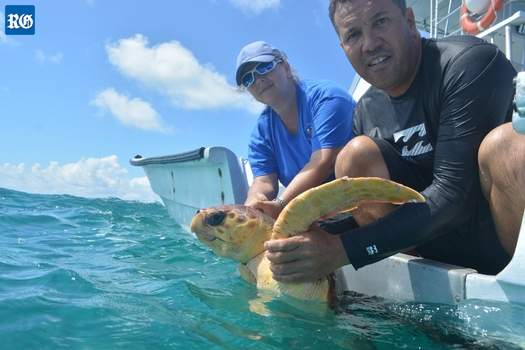Recent News
Fishermen split by reef predator reportThursday, May 11, 2017
The surest way to secure Bermuda’s reef fishing industry is to impose further restrictions and a ban on the sale of certain species according to lifelong fisherman Alan Card.
Rescue plan could stress out turtles
Wednesday, May 10, 2017
A plan to relocate sea turtles in advance of the America’s Cup has sparked concerns from environmentalists about the impact on the animals’ health.
Greenrock On Relocation Plan For Sea Turtles
Wednesday, May 10, 2017
“Greenrock was surprised by the announcement to capture and relocate sea turtles from the Great Sound for May and June, it is certainly an interesting initiative, and one that raises some questions for consideration,” Greenrock Executive Director Jonathan Starling said.
Great Sound turtles ‘moving home’ for Cup
Monday, May 08, 2017
Sea turtles are being temporarily relocated from the Great Sound to keep them out of harm’s way during the America’s Cup.
Sea Turtles Being ‘Temporarily Relocated’
Sunday, May 07, 2017
[Updated] In “anticipation of intense boating activity in the Great Sound,” the America’s Cup Bermuda is “coordinating a temporary sea turtle relocation project,” in which “sea turtles will be netted based on methods used successfully for turtle tagging operations and temporarily relocated inside a purpose-built ocean enclosure” near the Aquarium in Flatts.
About
GovernanceAbout Us
Newsletter
Latest News
Gift & Bookstore
Contact
General Inquiries
info@bzs.bm
Latest News
All the latest updates and news from the Bermuda Aquarium, Museum, and Zoo, one of Bermuda's leading visitor attractions!
Owain Johnston-Barnes
Published Jul 25, 2017 at 8:00 am (Updated Jul 25, 2017 at 10:33 am)

Animal care and quarantine officer Roma Hayward and senior aquarist Choy Aming
release Chad the loggerhead turtle back into the sea (photo provided)
A loggerhead turtle rescued by divers has been returned to the sea after nine months of care.
The turtle, nicknamed “Chad” by his rescuers, had been found tangled in cargo netting in Ely’s Harbour last October by Blue Water Divers.
While they were able to free the distressed animal, they became concerned when they noticed that he appeared unable to dive underwater and took the turtle to the Bermuda Aquarium, Museum and Zoo.
A spokeswoman for the Department of Environment and Natural Resources said that Ian Walker, a veterinarian and the principal curator at Bamz, examined Chad and found “significant grooves” in the turtle’s top shell. The grooves suggested that Chad had been tangled in the netting for some time before being freed.
“It took about ten days for Chad to start diving to the bottom of his enclosure,” the spokeswoman said.
“One theory for the buoyancy problem is that turtles hyperinflate their lungs as a survival mechanism. Since they are air breathers, making themselves positively buoyant would assist them staying at the surface to breathe in spite of the weight of the net.
“Another theory is that this is how their bodies respond to an infection. There were numerous locations where the shell was ulcerated and there was a concern the turtle was septic and therefore would not have a very good prognosis.”
Over the next few months, Chad was kept at the aquarium where he could be given food, antibiotics and time to recover.
“The healing process took quite a while,” the spokeswoman added.
“Turtles can be quite resilient but they take their time getting better. Winter water temperatures slowed things down but as the water started to warm up, the healing moved along nicely.”
Roma Hayward, animal care and quarantine officer, was tasked with debriding the wounds monthly to assist with the healing process.
“Chad survived a terrible ordeal and has healed well,” she said.
“He will have a microchip and flipper tags in the event he shows up somewhere else. He will be able to be identified and it signifies that he was captured before.”
While green and hawksbill turtles are more commonly seen, loggerhead turtles are regular visitors to the island.
Loggerheads found in Bermuda are usually post-hatchlings — turtles younger than a year — who are washed in with sargassum weed in the winter and spring, but Chad is older than most seen in Bermuda’s waters.
Now back in the ocean, Chad is expected to settle in the Eastern Atlantic to start the next stage of his life — assuming he is a “he” at all.
The spokeswoman explained that gender-signifying features only appear once loggerheads reach adulthood, a milestone Chad had not yet reached.
“Chad may not be male,” the spokeswoman added. “His caregivers are unsure of the gender at this time.”


